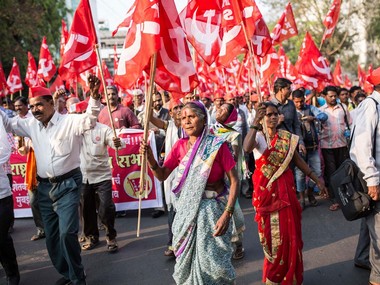Tribal and Dalit rights organisations have called for
bharat bandh on Tuesday protesting against the
13 February Supreme Court order , which had directed at least 21 states to evict traditional forest and tribal dwellers whose claims over the forest land have been rejected by authorities. Although the apex court put a stay on its order after a petition was filed by the Centre on 27 February, rights groups are demanding that the government issue an ordinance to ensure that the rights of the marginalised communities are protected. Adivasi groups across the states have called upon political and social activists to join them in their march from Mandi House to Jantar Mantar, Delhi as part of the bandh on Tuesday. The aim is to highlight the issue of restoring the Forest Rights Act. [caption id=“attachment_4493119” align=“alignleft” width=“380”] Representational image. PARI[/caption] They are also rallying for an ordinance to be passed to ensure fair representation in
University Grants Commission (UGC) faculty posts. The Supreme Court had upheld an Allahabad High Court order over reservation of SC/STs in the appointment of faculty members in universities
in January. According to reports, the groups are also demanding that the Centre establish the Indian Judicial Services under Article 312 of the Constitution, which will provide for inclusion of SCs, STs, OBCs, other minorities, and women in recruitment processes in higher judiciary posts. Tribal outfits across states like Madhya Pradesh, Rajasthan, Gujarat, West Bengal, Jharkhand, Chhattisgarh, and north-east have called for a peaceful bandh. On 27 February, the apex court agreed to hear the Centre’s plea seeking withholding of its 13 February. The Centre had rushed to the top court for a modification of the order saying the Scheduled Tribes and Other Traditional Forest Dwellers (Recognition of Forest Rights) Act, 2006 was a “beneficial” legislation and should be construed liberally to help “extremely poor and illiterate people” who are not well informed of their rights and procedure under the law. The government’s preventive move came after it was accused by activists of being lax regarding the hearing of petitions challenging the Forest Rights Act. On 28 February, a Supreme Court bench comprising Justices Arun Mishra, Naveen Sinha and MR Shah stayed the eviction order and directed the state governments to file affidavits providing details of the process adopted in rejecting the claims made by the Forest Dwelling Scheduled Tribes (FDSTs) and Other Traditional Forest Dwellers (OTFDs). Earlier on 1 March, a fresh petition was filed in the top court seeking direction to the authorities not to evict any forest-dweller and setting up of a SIT to look into illegal acquisition of tribal land in the country. The plea, filed by Chhattisgarh-based Tarika Tarangini Larka, also sought a direction to the Centre not to allot possession of any forest land belonging to tribals to anyone other than ‘Adivasis’ residing in that particular area. Advocate ML Sharma, appearing for Tarika Tarangini Larka, mentioned the petition on Friday for urgent listing before a bench comprising Justices AK Sikri and SK Kaul. In the petition, Tarika Tarangini Larka alleged that authorities in Tamnar of Raigarh district of Chhattisgarh have forcefully grabbed a large area of tribal land and handed it to outsiders and are now trying to oust Adivasis from the area. “For this, they adopted simple strategy declaring forest-dwellers as non-Adivasis to grab their land in the forest and village by rejecting their claim upon the land,” the plea said. The plea has also sought restoration of land acquired by the government from tribals in Chhattisgarh for mining and other purposes and to provide them with a value of mined minerals. The petition has also sought setting up of a special investigation team (SIT) comprising retired judges of the apex court to look into the illegal acquisition of land belonging to tribals throughout the country. With inputs from agencies
Tribal and Dalit rights organisations have called for bharat bandh on Tuesday protesting against the 13 February Supreme Court order, which had directed at least 21 states to evict traditional forest and tribal dwellers whose claims over the forest land have been rejected by authorities.
Advertisement
End of Article


)

)
)
)
)
)
)
)
)



